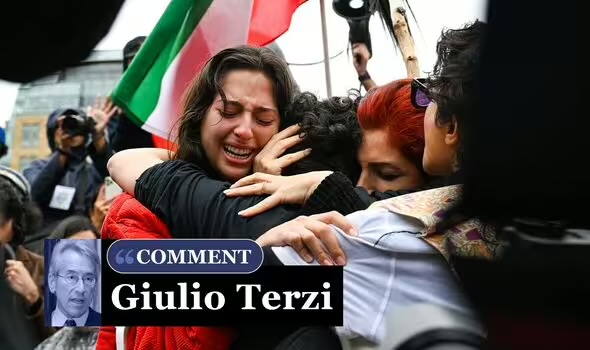It has been almost a year since Iran’s anti-government uprising. Scenes of young Iranians, women, and men, crying for freedom in the streets, challenging the clerical regime and its armed repressive forces for months, shocked the world. The regime is plainly still struggling to restore the status quo. Autocracies are on the rise the world over. Yet, even among them, the ayatollahs stand out.
Given Tehran’s destructive role on the international scene for the past four decades, the ongoing deep-rooted tumult in Iran provided a unique opportunity for Western powers to fundamentally change the situation in the volatile Middle East. However, this has two prerequisites: a correct understanding of the dynamics in Iran and the courage to change prevailing policies accordingly.
Unfortunately, there are still Western governments that seem to be ready to let Tehran suppress dissent both at home and abroad by providing sanctions relief or other concessions. This is a huge mistake since the protests that started last year were the most significant challenge to the theocratic dictatorship so far. The movement encompassed approximately 300 cities and towns spanning all 31 Iranian provinces and involved participation from every social class, ethnic group, and generation.
Universities were a hotbed for political activity for months, but even more significantly, high school students also actively took part in the uprising – especially high school girls. There were multiple reports of girls shouting down government officials who came to plead for the restoration of order and driving them off campus. Videos posted to social media showed collective efforts to remove and deface images of the regime’s founder Ruhollah Khomeini, and current Supreme Leader Ali Khamenei, which are required to be kept on display in all classrooms.
Recently, the Islamic Republic surpassed 500 executions for the current year. Organisations such as the United Nations Human Rights Council have expressed an understanding that the underlying wave of executions is intended to intimidate the public into silence. Indeed, seven individuals have been executed specifically for their participation in last year’s uprising, and dozens of similar executions may yet be pending, as the Iranian judiciary is likely biding its time to see whether or not the international community is willing to look the other way on such gross human rights violations.
Concessions would clearly communicate such willingness. Expanded sanctions and greater diplomatic isolation would send exactly the opposite message, thereby pressuring Tehran to think twice about its repressive strategies while also signalling to Resistance activists that the democratic nations of the world are ready to stand on their side, and thus on the right side of history.
There should be no question about which course of action Western powers take, but sadly there is. Some in the West have speculated that the regime might be willing to “compromise” in the wake of the uprising. But Tehran has explicitly rejected this notion on all strategic issues, and the West should recognise what that means. For the better part of the last 44 years, policymakers have been far too credulous about the prospect of internal reform of the Iranian regime.
Fearing confrontation with that regime, they have put their faith in “reformists” and “moderates” to temper its more malign impulses. But this strategy has consistently failed to pay off, and those malign impulses have inevitably grown stronger, especially at times when the regime appeared more vulnerable to its own restive population.
The strategy of hopeful appeasement should, therefore, have been abandoned long ago. It should certainly have been abandoned in the run-up to the latest uprising, as Khamenei systematically drove out “moderates” from the government. And it should have most certainly been abandoned in the wake of the uprising, as Tehran made clearer than ever before that it is incapable of responding to domestic dissent with anything other than brutal repression.
Within several weeks of the outbreak of last year’s uprising, authorities killed some 750 protesters and arrested 30,000 others. The network of the country’s leading pro-democracy opposition group, the People’s Mojahedin Organization of Iran (MEK), reported the regime’s atrocities early and often. MEK-affiliated “resistance units” also played a key role in organising protests and promoting slogans that clarified the people’s desire for regime change and the establishment of a democratic republic.
Over the years, Western governments have tended to view regime change in Iran as a gamble with an extremely uncertain outcome. The reality is that there is an organised opposition movement that has been steadily gaining steam over the years and causing popular dissent to coalesce around its defined vision for an Iranian republic based on secularism, equal rights, and the rule of law, as articulated in the ten-point plan of Maryam Rajavi, the president of the National Council of Resistance of Iran. The Iranian situation is heading toward a major change and the West cannot afford to be caught off guard. The US and EU should have the courage to open a new policy regarding Iran, a policy that identifies with the Iranian people, is in line with our values, and can have long-lasting impact on the whole Middle East.
Sen. Giulio Terzi
Read the original article on the Express

